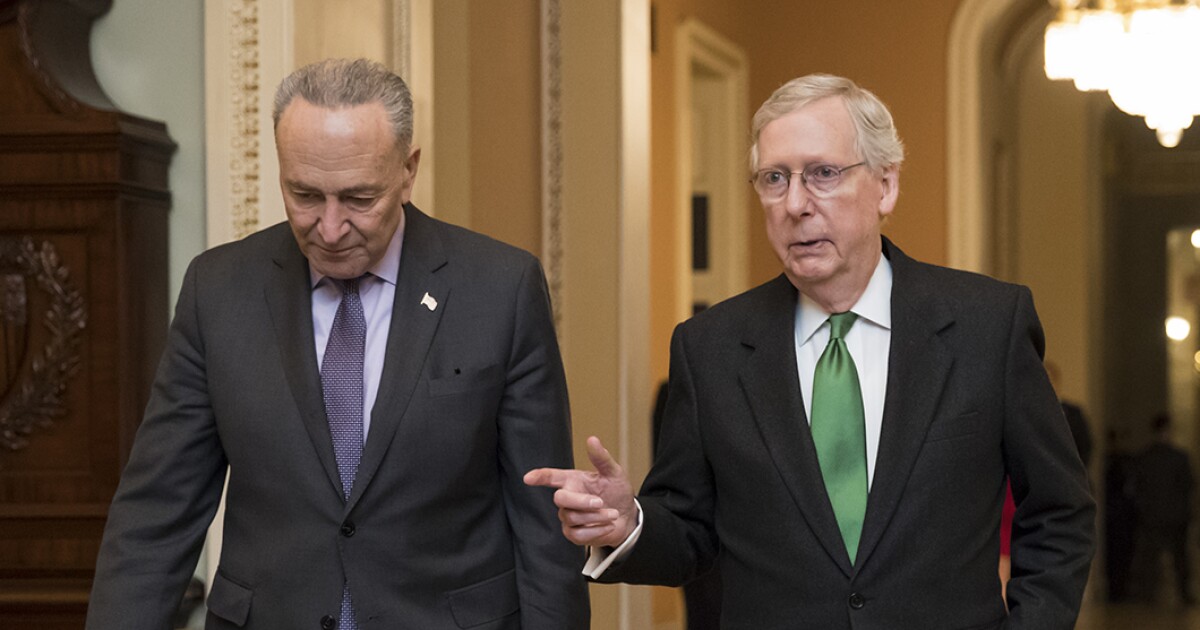

The Senate is now considering the debt ceiling agreement made between President Joe Biden and House Speaker Kevin McCarthy (R-CA).
The chamber faces a swiftly approaching deadline before the United States defaults on its debt for the first time in history, with Senate Majority Leader Chuck Schumer (D-NY) saying on Wednesday that the Senate would “move quickly” to pass the bill and send it to Biden’s desk.
EVERY HOUSE MEMBER WHO VOTED AGAINST PASSING THE DEBT CEILING BILL
The House passed the Fiscal Responsibility Act in a 314-117 vote, with 165 Democrats joining 149 Republicans to back the legislation.
However, Senate leadership is likely to consider several amendments to the debt ceiling compromise that senators file in opposition to certain provisions, which could put off raising the debt ceiling for a while longer. Here are five things to monitor while lawmakers debate over raising the debt limit.
Deadline for Senate to pass bill
Treasury Secretary Janet Yellen recently moved the “X-date,” the date the U.S. will default on its debts, to June 5. Her previous estimate had the date as Thursday, June 1.
It was speculated that senators may go into the weekend to complete their work on the debt ceiling bill, as a vote on final passage could be held up due to introduced amendments. Schumer warned senators to prepare for “Friday and weekend votes.”
“We’re getting close to putting this threat of default behind us,” Schumer said on Wednesday. “But there’s still more work, perhaps the most important work, to do: passing it into law.”
However, Sen. Kevin Cramer (R-ND) told reporters that wrapping up by Friday would be ideal.
“That’s the hope and the dream, at least,” Cramer said of Friday. “That’s where yielding to a lot of amendment votes could get us that.”
Amendments heading to the Senate floor
Senate Minority Leader Mitch McConnell (R-KY) said he believes the Senate could quickly wrap up a time agreement, which limits the time for debate on a bill or other measures.
Senate procedural rules allow for an individual senator to hold up a bill for about a week. Several senators have already voiced that they will introduce amendments, such as Sens. Rand Paul (R-KY) and Mike Lee (R-UT).
Paul said he plans to present an alternative plan that would impose many more budget cuts and would raise the debt limit for a shorter amount of time. While he is well aware the amendment could fail, Paul still wants the Senate to vote on it, which is likely to drag out the process. McConnell and Sen. Lindsey Graham (R-SC) have voiced opposition to capping national security spending, with the former calling it the “worst part” of the debt ceiling agreement.
Sen. Mike Braun (R-IN) told the Washington Examiner that if Senate leadership declines to bring amendments to the floor for a vote, “something’s gonna stop the process.”
Schumer has warned against Republicans and some Democrats introducing amendments, as it will force the bill back to the House for a vote and delay the process even further.
“We cannot send anything back to the House. Plain and simple,” Schumer said Wednesday.
Senators already a “no” on the debt ceiling bill
Several senators have spoken out against the bill or already declared they are a “no” vote from both sides of the aisle.
Paul, Lee, Braun, and Sens. Ted Cruz (R-TX), Josh Hawley (R-MO), Tim Scott (R-SC), and Rick Scott (R-FL) have said they will vote against the measure.
Two Democrats, Sens. Ed Markey (D-MA) and Jeff Merkley (D-OR), and one independent, Sen. Bernie Sanders (I-VT), have spoken against the bill and indicated they will vote “no.” Sen. Elizabeth Warren (D-MA) has also voiced concerns over the bill but has not directly said she will vote against it.
Mountain Valley Pipeline provision
Under the debt ceiling agreement, the last 14 miles of the Mountain Valley Pipeline will be completed — a provision that has faced vocal opposition from Democrats.
Merkley cited the pipeline project as a reason for his “no” vote.
“In sum, there is virtually nothing in this bill that matches what the people of Oregon care about, and a whole lot of stuff that will hurt them. I can’t throw them under the bus. I cannot in good conscience support this legislation,” Merkley said in a statement.
Sanders said in a statement that he can not in “good conscience” vote for a bill completing the pipeline at a time “when climate change is, by far, the most existential threat facing our country and the world.”
Meanwhile, the completion of the Mountain Valley Pipeline is likely to secure a “yes” vote from Sen. Joe Manchin (D-WV). It is expected to draw several Republicans to vote in favor of passage as well.
Sen. Tim Kaine (D-VA) is going to introduce the only expected amendment to be offered by Democrats: stripping the completion of the pipeline from the deal. He told reporters he was blindsided by the 303-mile pipeline being included in the agreement between Biden and McCarthy and that he was not given a heads-up ahead of time by the White House.
“Look, I want Joe Manchin to do well. I don’t want him to falter. … But I mean, this is a Virginia project, and they didn’t even bother to pick up the phone and call me,” Kaine said via the Hill.
How the 2024 election will affect debt ceiling votes
Several vulnerable senators up for reelection in 2024 will need to weigh their vote on the debt ceiling carefully. Eyes will be on centrist Democrats in particular, such as Manchin and Sens. Kyrsten Sinema (I-AZ) and Jon Tester (D-MT), to see if they support the bill.
Tester indicated he would vote “yes” on the bill in the end. Sinema typically does not publicly disclose her intended vote on any measure until she casts it on the Senate floor.
Some left-leaning Democrats, such as Sen. Sherrod Brown (D-OH), voiced their complete support of the bill. He told reporters it would be an “easy vote” and enjoyed that the bill included protections for Social Security and Medicaid.
“It was the right thing, and we didn’t default,” Brown said.
CLICK HERE TO READ MORE FROM THE WASHINGTON EXAMINER
On the other side of the aisle, Tim Scott already vocalized his opposition to the bill. As a 2024 Republican presidential candidate, he is under scrutiny more than most.
“The question I ask myself was at the end of the negotiations, is it in our best interests as a nation to allow Joe Biden, someone we cannot trust on spending, to have an open checkbook, no limit on the credit card until the end of his term? And my answer is no,” Tim Scott said in an interview with Axios.





